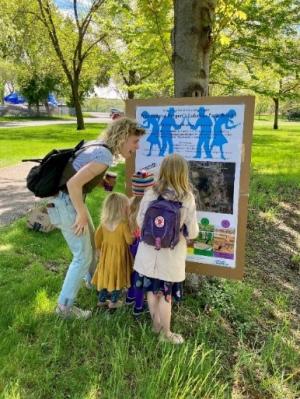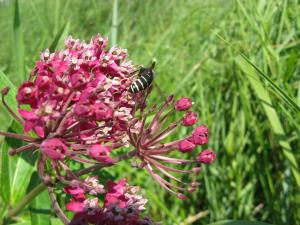What's Working for Conservation
Project Promotion
2020 Information
East Metro Water Resource Education Program
Background: The East Metro Water Resource Education Program (EMWREP) is a partnership hosted by Washington Conservation District that was formed in 2006 to educate community residents, businesses, staff and decision-makers about issues affecting local lakes, rivers, streams, wetlands and groundwater resources and to engage people in projects that will help to protect and improve the health of these water resources. Over the past 15 years, the EMWREP program has grown from six local government partners to 25. In 2021, EMWREP will expand further to serve portions of Anoka, Chisago, Isanti and Pine Counties and support implementation of the Lower St. Croix “One Watershed” Plan.
Partnership Structure: Current EMWREP partners include:
- Washington Conservation District (host), Washington County
- Watershed management organizations: Brown’s Creek, Carnelian-Marine-St. Croix, Comfort-Lake Forest Lake, Rice Creek, Ramsey-Washington Metro, South Washington, and Valley Branch Watershed Districts, and the Middle St. Croix Watershed Management Organization
- Cities and townships: Bayport, Cottage Grove, Dellwood, Forest Lake, Grant, Hugo, Lake Elmo, Newport, Oakdale, Oak Park Heights, Stillwater, St. Paul Park, Willernie, and Woodbury, West Lakeland Township
Partners jointly fund the program based on a set formula, with fees determined by population (cities) or taxable market value (watershed organizations). A steering committee comprised of representatives from each of the partner organizations meets twice a year to provide recommendations on the program budget and activities.
EMWREP’s program coordinator, Angie Hong, communicates regularly with partner staff, council members and board members; prepares an annual report detailing program activities; and provides data for partners’ MS4 Permit reports. EMWREP plans and reports are available on-line at www.mnwcd.org/emwrep.
Coordination and collaboration: The EMWREP partnership helps to strengthen relationships between member entities and allows for better coordination and less overlap in the management of local water resources.
EMWREP staff also provide leadership for Watershed Partners (a collaborative of more than 60 non-profit and public entities in the Twin Cities metro area) and the St. Croix Environmental Education Partnership (SWEEP); participate in the Blue Thumb and Minnesota Water Stewards programs; and collaborate with nonprofit and citizen-led groups in the region.
Professional training for business and local government:
- Provide technical training to help EMWREP partners meet MS4 Permit requirements and reduce stormwater pollution.
- Work with University of Minnesota to provide high-quality professional education locally.
- Provide local decision makers (city councils, planning commissions, watershed boards, county commissioners, etc.) with information and training needed to implement policies, programs, and practices that protect and restore water resources.
- Offer professional trainings for area business owners, realtors, lawn care providers, and winter maintenance contractors to share information about local water issues and encourage business practices that protect surface and groundwater resources.
Two good landing pages on the WCD website that highlight education programming. http://www.mnwcd.org/planting-for-clean-water and http://www.mnwcd.org/virtual-tour (Angie Hong, Senior Water Resource Education Specialist, Washington Conservation District)
2008 - 2016 Information
Promoting Water Quality Projects: The East Metro Water Resource Education Program (EMWREP)
Conservation District, Watershed District, County and City partners) coordinates outreach with technical assistance provided by the Washington Conservation District and cost-share funding provided by the Watershed Districts. Interested homeowners (also businesses, churches and schools) learn about Blue Thumb (coordinated planting for clean water marketing efforts) through EMWREP outreach activities (neighborhood parties, workshops, presentations and news articles). Washington Conservation District provides free site visits for anyone in Washington County. Watersheds provide cost-share grants (up to 50%) for qualifying projects. Washington Conservation District has contracts with many of the watershed districts to provide garden design and installation assistance as well. 55 projects were installed with partners in 2008 (Washington Conservation District).
DNR Roadsides for Wildlife uses five main educational/advertising strategies: An annual poster and mailings to road authorities and wildlife affiliates; Brochures, website, and DVDs, aluminum Roadsides for Wildlife signs; targeted conference presentations and booths; Cooperation with other educators and conservation groups; and Targeting of K-8 teachers and students through curriculum activities (DNR Roadsides for Wildlife Program).
Pollinator Outreach: We have tied our Prairie Restoration program to the National Pollinator Protection Campaign. In doing so we have partnered with other public entities during National Pollinator Week to host an event to increase local awareness (Gina Hugo, Sherburne SWCD).
Newspaper Articles: Submitting articles to the local newspapers on prairie projects that have a human interest spin has also helped to increase awareness (Gina Hugo, Sherburne SWCD).
Landowner Engagement: It has been important in all our successful plantings to offer as much assistance as possible. This includes enough financial incentive to make the final out-of-pocket cost for private landowners and public land managers low to none. We find that the best ownership happens when some portion of the installation or site preparation be done with the landowner (Gina Hugo, Sherburne SWCD).
Direct Contact with Landowners: The best way to promote projects is one on one contact with individuals. Radio programs have had some success, holding district/NRCS meetings across the county where producers come to us has also been successful (Redwood SWCD)


